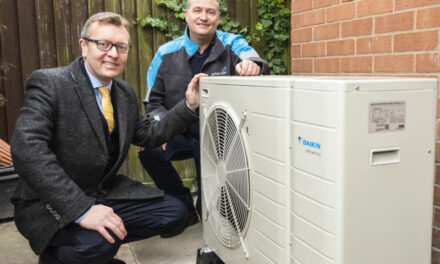Britain’s high street businesses are using energy to gain a competitive advantage on rivals, according to new research by E.ON which advised that old or inefficient appliances could be punishing their attempts to increase revenue.
The study revealed that more than half (58%) of small businesses observe the efficiency habits to learn from neighbouring stores and more than one in ten (12%) use electricity as a tactic to lure customers from competitors – such as through the use of shop-front gadgets and attractive lighting.
But while businesses say energy can boost prospects, many may be wasting far more than they realise. Nine in ten (91%) believe others in their sector are less efficient than they are, whilst still admitting that their industry sectors are beset with inefficient energy practices.
Overuse of equipment or machinery is the most common energy ‘mistake’ identified by small firms (49%) as well as the use of inefficient or outdated appliances and fixtures (42%). Excessive use of lighting (38%) and air conditioning and/or heating (29%) were also highlighted as regular pitfalls.
Anthony Ainsworth, business energy director at E.ON, said: “This research paints a picture of British businesses sitting side-by-side on the high street, competing not just amongst rival firms in the same sectors but also against neighbours in order to attract customers. Using attractive lighting can be a useful way to exhibit goods or attract customers but it may not be cost-effective if you rely on outdated or inefficient fixtures to light your store through the night. One of our customers – a small supermarket – told us he’d managed to save £600 a month by replacing his older lighting with new LED fittings! Small behavioural changes can significantly improve efficiency, such as upgrading equipment and the systems for controlling them. This needn’t be costly for small businesses. At E.ON we have a package of help and advice on offer so customers can identify areas of waste and help implement changes, showing the potential cost savings against any investment required. Improvements can often be made for free.”
CASE STUDY
Beken & Son, based in Cowes, Isle of Wight, is a photographic, computer accessories, binoculars and puzzles shop, offering a range of photographic accessories and services to customers.
Rod Hiller, owner and manager of Beken & Son, said: “Energy plays a big part in keeping my business running. I use lighting throughout the shop as well as for display purposes. I have a large double-fronted window display which, in the winter months in particular, requires a significant amount of illumination to showcase my items to passers-by. Lighting helps to support an important sales strategy but energy also has clear practical uses I couldn’t do without.
“I have found that by directly following some simple tips from E.ON, such as introducing energy saving, longer life light bulbs, I have made significant savings and improved our efficiency. E.ON has been particularly good at helping me pinpoint exactly where my energy is being used, both through their advice and the tools they offer. I have been using an E.ON business energy manager device for the past year and a half, which enables me to measure energy usage in real-time. I keep the device next to my desk so I can track my energy use throughout the day, and have noticed some immediate benefits resulting from some simple efficiency changes I have made.”
The majority of small business owners said they are motivated to manage and control workplace energy use better (88%). However, two thirds (66%) said they are prevented from doing so due to factors such as the cost of new technology.
Industry specific findings included the following:
· Catering/hospitality businesses are most likely to leave equipment on when not in use (57%).
· Over half (52%) of retailers leave window displays lit up throughout the night.
· Professional services firms collaborate most frequently with industry peers to learn energy saving techniques and best practice (27%).
· One in six catering firms (16%) and one in seven retail outlets (14%) use electricity to compete with rivals.
E.ON’s Energy Toolkit service is a package of energy saving help and advice for small business customers across a number of industry sectors including Retail. It is designed to give greater visibility on where and when energy is used most, for individual businesses and across their sector, to help detect waste and identify areas where changes can be made.



